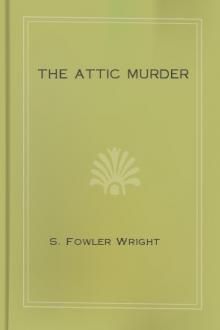Jennie Baxter, Journalist - Robert Barr (novels in english .TXT) 📗

- Author: Robert Barr
Book online «Jennie Baxter, Journalist - Robert Barr (novels in english .TXT) 📗». Author Robert Barr
balcony, which hung against the castle wall like a swallow's nest at the eaves of a house. This balcony was just wide enough to give ample space for one of the easy rocking-chairs which the Princess had imported from America, and which Jennie thought were the only really comfortable pieces of furniture the old stronghold possessed, much as she admired the artistic excellence of the mediaeval chairs, tables, and cabinets which for centuries had served the needs of the ancient line that had lived in the Schloss. The rocking-chair was as modern as this morning's daily paper; its woodwork painted a bright scarlet, its arms like broad shelves, its rockers as sensitively balanced as a marine compass; in fact, just such a chair as one would find dotted round the vast verandah of an American summer hotel. In this chair sat Miss Jennie, two open letters on her lap, and perplexity in the dainty little frown that faintly ruffled the smoothness of her fair brow. The scene from the high balcony was one to be remembered; but, although this was her last day at the Castle, the girl saw nothing of the pretty town of Meran so far below; the distant chalk-line down the slope beyond which marked the turbulent course of the foaming Adege; the lofty mountains all around, or the further snow-peaks, dazzling white against the deep blue of the sky.
One of the epistles which lay on her lap was the letter she had received from the editor recounting the difficulties he had met with while endeavouring to make arrangements for reporting adequately the Duchess of Chiselhurst's ball; the other was the still unanswered invitation from the Duchess to the Princess. Jennie was flattered to know that already the editor, who had engaged her with unconcealed reluctance, expected her to accomplish what the entire staff were powerless to effect. She knew that, had she but the courage, it was only necessary to accept the invitation in the name of her present hostess, and attend the great society function as Princess von Steinheimer. Yet she hesitated, not so much on account of the manifest danger of discovery, but because she had grown to like the Princess, and this impersonation, if it came to the knowledge of the one most intimately concerned, as it was almost sure to do, would doubtless be regarded as an unpardonable liberty. As she swayed gently back and forth in the gaudy rocking-chair, she thought of confessing everything to the Princess and asking her assistance; but pondering on this, she saw that it was staking everything on one throw of the dice. If the Princess refused, then the scheme became impossible, as that lady herself would answer the letter of the Duchess and decline the invitation. Jennie soothed her accusing conscience by telling herself that this impersonation would do no harm to Princess von Steinheimer, or to anyone else for that matter, while it would be of inestimable assistance to her own journalistic career. From that she drifted to meditation on the inequalities of this life--the superabundance which some possess, while others, no less deserving, have difficulty in obtaining the scant necessities. And this consoling train of thought having fixed her resolve to take the goods the gods scattered at her feet, or rather threw into her lap, she drew a long sigh of determination as there came a gentle tap at the door of her room, and the voice of the Princess herself said, "May I come in?"
Jennie, a rapid blush flaming her cheeks, sprang to her feet, flung the letters on a table, and opened the door.
The visitor entered, looking attractive enough to be a princess of fairyland, and greeted Miss Baxter most cordially.
"I am so sorry you are leaving," she said. "Cannot you be persuaded to change your mind and stay with me? Where could you find a more lovely view than this from your balcony here?"
"Or a more lovely hostess?" said the girl, looking at her visitor with undisguised admiration and quite ignoring the landscape.
The Princess laughed, and as they now stood together on the balcony she put out her hands, pushed Jennie gently into the rocking-chair again, seating herself jauntily on its broad arm, and thus the two looked like a pair of mischievous schoolgirls, home at vacation time, thoroughly enjoying their liberty.
"There! You are now my prisoner, about to be punished for flattery," cried the Princess. "I saw by the motion of the chair that you had just jumped up from it when I disturbed you, so there you are, back in it again. What were you thinking about? A rocking-chair lends itself deliciously to meditation, and we always dream of someone very particular as we rock."
"I am no exception to the rule," sighed Jennie; "I was thinking of you, Princess."
"How nice of you to say that; and as one good turn deserves another, here is proof that a certain young lady has been in my thoughts."
As she spoke, the Princess took from her pocket an embossed case of Russian leather, opened it and displayed a string of diamonds, lustrous as drops of liquid light.
"I want you to wear these stones in remembrance of our diamond mystery--that is why I chose diamonds--and also, I confess, because I want you to think of me every time you put them on. See how conceited I am! One does not like to be forgotten."
Jennie took the string, her own eyes for a moment rivalling in brilliancy the sparkle of the gems; then the moisture obscured her vision and she automatically poured the stones from one hand to the other, as if their scintillating glitter hypnotized her. She tried once or twice to speak, but could not be sure of her voice, so remained silent. The Princess, noticing her agitation, gently lifted the necklace and clasped it round the girl's white throat, chattering all the while with nervous haste.
"There! you can wear diamonds, and there are so many to whom they are unbecoming. I also look well in diamonds--at least, so I've been told over and over again, and I've come to believe it at last. I suppose the young men have not concealed from you the fact that you are a strikingly good-looking girl, Jennie. Indeed, and this is brag if you like, we two resemble one another enough to be sisters, nearly the same height, the same colour of eyes and hair. Come to the mirror, Miss Handsomeness, and admire yourself."
She dragged Jennie to her feet and drew her into the room, placing her triumphantly before the great looking-glass that reflected back a full-length portrait.
"Now confess that you never saw a prettier girl," cried the Princess gleefully.
"I don't think I ever did," admitted Jennie, but she was looking at the image of the Princess and not at her own. The Princess laughed, but Miss Baxter seemed too much affected by the unexpected present to join in the merriment. She regarded herself solemnly in the glass for a few moments, then slowly undid the clasp, and, slipping the string of brilliants from her neck, handed them back to the Princess. "You are very, very kind, but I cannot accept so costly a present."
"Cannot? Why? Have I offended you by anything I have said since you came?"
"Oh, no, no. It isn't that."
"What, then? Don't you like me, after all?"
"Like you? I _love_ you, Princess!" cried the girl impulsively, throwing her arms round the other's neck.
The Princess tried to laugh as she pressed Jennie closely to her, but there was a tremour of tears in the laughter.
"You must take this little gift as a souvenir of your visit with me. I was really--very unhappy when you came, and now--well, you smoothed away some misunderstandings--I'm more than grateful. And it isn't natural for a woman to refuse diamonds, Jennie."
"I know it isn't; and I won't quite refuse them. I'll postpone. It is possible that something I shall do before long may seriously offend you. If it does--then good-bye to the necklace! If it doesn't, when I have told you all about my misdeed--I shall confess courageously--you will give me the diamonds."
"Dear me, Jennie, what terrible crime are you about to commit? Why not tell me now? You have no idea how you have aroused my curiosity."
"I dare not tell you, Princess; not until my project proves a success or a failure. We women--some have our way made for us--others have our own way to make. I am among the others, and I hope you will remember that, if you are ever angry with me."
"Is it a new kind of speculation? A fortune made in a day? Gambling?"
"Something of that sort. I am going to stake a good deal on the turn of a card; so please pray that luck will not be against me."
"If pluck will make you win, I am sure you will carry it through, but if at first you don't succeed, try, try again; and if you haven't the money, I'll supply the capital. I know I should like to gamble. Anyhow, you have my best wishes for your success."
"Thank you, Princess. I can hardly fail after that."
The time had come when the two friends must part. The carriage was waiting to take Miss Baxter to the station, and the girl bade good-bye to her hostess with an uneasy feeling that she was acting disloyally to one who had befriended her. In her handbag was the invitation to the ball, and also the letter she had written in the Princess's name accepting it, which latter she posted in Meran. In due course she reached London, and presented herself to the editor of the _Daily Bugle_.
"Well, Miss Baxter," he said, "you have been extraordinarily successful in solving the diamond mystery, and I congratulate you. My letter reached you, I suppose. Have you given any thought to the problem that now confronts us? Can you get us a full report of the Duchess of Chiselhurst's ball, written so convincingly that all the guests who read it will know that the writer was present?"
"It is entirely a question of money, Mr. Hardwick."
"Most things are. Well, we are prepared to spend money to get just what we want."
"How much?"
"Whatever is necessary."
"That's vague. Put it into figures."
"Five hundred pounds; seven hundred; a thousand if need be."
"It will not cost you a thousand, and it may come to more than five hundred. Place the thousand to my credit, and I shall return what is left. I must go at once to Paris and carry out my plans from that city."
"Then you have thought out a scheme. What is it?"
"I have not only thought it out, but most of the arrangements are already made. I cannot say more about it. You will have to trust wholly to me."
"There is a good deal of money at stake, Miss Baxter, and our reputation as a newspaper as well. I think I should know what you propose to do."
"Certainly. I propose to obtain for you an accurate description of the ball, written by one who was present."
The editor gave utterance to a sort of interjection that always served him in place of a laugh.
"In other words, you want neither interference nor advice."
"Exactly, Mr. Hardwick. You know from experience that little good comes of talking too much of a secret project not yet completed."
The editor drummed with his fingers on the table for a few moments thoughtfully.
"Very well, then,
One of the epistles which lay on her lap was the letter she had received from the editor recounting the difficulties he had met with while endeavouring to make arrangements for reporting adequately the Duchess of Chiselhurst's ball; the other was the still unanswered invitation from the Duchess to the Princess. Jennie was flattered to know that already the editor, who had engaged her with unconcealed reluctance, expected her to accomplish what the entire staff were powerless to effect. She knew that, had she but the courage, it was only necessary to accept the invitation in the name of her present hostess, and attend the great society function as Princess von Steinheimer. Yet she hesitated, not so much on account of the manifest danger of discovery, but because she had grown to like the Princess, and this impersonation, if it came to the knowledge of the one most intimately concerned, as it was almost sure to do, would doubtless be regarded as an unpardonable liberty. As she swayed gently back and forth in the gaudy rocking-chair, she thought of confessing everything to the Princess and asking her assistance; but pondering on this, she saw that it was staking everything on one throw of the dice. If the Princess refused, then the scheme became impossible, as that lady herself would answer the letter of the Duchess and decline the invitation. Jennie soothed her accusing conscience by telling herself that this impersonation would do no harm to Princess von Steinheimer, or to anyone else for that matter, while it would be of inestimable assistance to her own journalistic career. From that she drifted to meditation on the inequalities of this life--the superabundance which some possess, while others, no less deserving, have difficulty in obtaining the scant necessities. And this consoling train of thought having fixed her resolve to take the goods the gods scattered at her feet, or rather threw into her lap, she drew a long sigh of determination as there came a gentle tap at the door of her room, and the voice of the Princess herself said, "May I come in?"
Jennie, a rapid blush flaming her cheeks, sprang to her feet, flung the letters on a table, and opened the door.
The visitor entered, looking attractive enough to be a princess of fairyland, and greeted Miss Baxter most cordially.
"I am so sorry you are leaving," she said. "Cannot you be persuaded to change your mind and stay with me? Where could you find a more lovely view than this from your balcony here?"
"Or a more lovely hostess?" said the girl, looking at her visitor with undisguised admiration and quite ignoring the landscape.
The Princess laughed, and as they now stood together on the balcony she put out her hands, pushed Jennie gently into the rocking-chair again, seating herself jauntily on its broad arm, and thus the two looked like a pair of mischievous schoolgirls, home at vacation time, thoroughly enjoying their liberty.
"There! You are now my prisoner, about to be punished for flattery," cried the Princess. "I saw by the motion of the chair that you had just jumped up from it when I disturbed you, so there you are, back in it again. What were you thinking about? A rocking-chair lends itself deliciously to meditation, and we always dream of someone very particular as we rock."
"I am no exception to the rule," sighed Jennie; "I was thinking of you, Princess."
"How nice of you to say that; and as one good turn deserves another, here is proof that a certain young lady has been in my thoughts."
As she spoke, the Princess took from her pocket an embossed case of Russian leather, opened it and displayed a string of diamonds, lustrous as drops of liquid light.
"I want you to wear these stones in remembrance of our diamond mystery--that is why I chose diamonds--and also, I confess, because I want you to think of me every time you put them on. See how conceited I am! One does not like to be forgotten."
Jennie took the string, her own eyes for a moment rivalling in brilliancy the sparkle of the gems; then the moisture obscured her vision and she automatically poured the stones from one hand to the other, as if their scintillating glitter hypnotized her. She tried once or twice to speak, but could not be sure of her voice, so remained silent. The Princess, noticing her agitation, gently lifted the necklace and clasped it round the girl's white throat, chattering all the while with nervous haste.
"There! you can wear diamonds, and there are so many to whom they are unbecoming. I also look well in diamonds--at least, so I've been told over and over again, and I've come to believe it at last. I suppose the young men have not concealed from you the fact that you are a strikingly good-looking girl, Jennie. Indeed, and this is brag if you like, we two resemble one another enough to be sisters, nearly the same height, the same colour of eyes and hair. Come to the mirror, Miss Handsomeness, and admire yourself."
She dragged Jennie to her feet and drew her into the room, placing her triumphantly before the great looking-glass that reflected back a full-length portrait.
"Now confess that you never saw a prettier girl," cried the Princess gleefully.
"I don't think I ever did," admitted Jennie, but she was looking at the image of the Princess and not at her own. The Princess laughed, but Miss Baxter seemed too much affected by the unexpected present to join in the merriment. She regarded herself solemnly in the glass for a few moments, then slowly undid the clasp, and, slipping the string of brilliants from her neck, handed them back to the Princess. "You are very, very kind, but I cannot accept so costly a present."
"Cannot? Why? Have I offended you by anything I have said since you came?"
"Oh, no, no. It isn't that."
"What, then? Don't you like me, after all?"
"Like you? I _love_ you, Princess!" cried the girl impulsively, throwing her arms round the other's neck.
The Princess tried to laugh as she pressed Jennie closely to her, but there was a tremour of tears in the laughter.
"You must take this little gift as a souvenir of your visit with me. I was really--very unhappy when you came, and now--well, you smoothed away some misunderstandings--I'm more than grateful. And it isn't natural for a woman to refuse diamonds, Jennie."
"I know it isn't; and I won't quite refuse them. I'll postpone. It is possible that something I shall do before long may seriously offend you. If it does--then good-bye to the necklace! If it doesn't, when I have told you all about my misdeed--I shall confess courageously--you will give me the diamonds."
"Dear me, Jennie, what terrible crime are you about to commit? Why not tell me now? You have no idea how you have aroused my curiosity."
"I dare not tell you, Princess; not until my project proves a success or a failure. We women--some have our way made for us--others have our own way to make. I am among the others, and I hope you will remember that, if you are ever angry with me."
"Is it a new kind of speculation? A fortune made in a day? Gambling?"
"Something of that sort. I am going to stake a good deal on the turn of a card; so please pray that luck will not be against me."
"If pluck will make you win, I am sure you will carry it through, but if at first you don't succeed, try, try again; and if you haven't the money, I'll supply the capital. I know I should like to gamble. Anyhow, you have my best wishes for your success."
"Thank you, Princess. I can hardly fail after that."
The time had come when the two friends must part. The carriage was waiting to take Miss Baxter to the station, and the girl bade good-bye to her hostess with an uneasy feeling that she was acting disloyally to one who had befriended her. In her handbag was the invitation to the ball, and also the letter she had written in the Princess's name accepting it, which latter she posted in Meran. In due course she reached London, and presented herself to the editor of the _Daily Bugle_.
"Well, Miss Baxter," he said, "you have been extraordinarily successful in solving the diamond mystery, and I congratulate you. My letter reached you, I suppose. Have you given any thought to the problem that now confronts us? Can you get us a full report of the Duchess of Chiselhurst's ball, written so convincingly that all the guests who read it will know that the writer was present?"
"It is entirely a question of money, Mr. Hardwick."
"Most things are. Well, we are prepared to spend money to get just what we want."
"How much?"
"Whatever is necessary."
"That's vague. Put it into figures."
"Five hundred pounds; seven hundred; a thousand if need be."
"It will not cost you a thousand, and it may come to more than five hundred. Place the thousand to my credit, and I shall return what is left. I must go at once to Paris and carry out my plans from that city."
"Then you have thought out a scheme. What is it?"
"I have not only thought it out, but most of the arrangements are already made. I cannot say more about it. You will have to trust wholly to me."
"There is a good deal of money at stake, Miss Baxter, and our reputation as a newspaper as well. I think I should know what you propose to do."
"Certainly. I propose to obtain for you an accurate description of the ball, written by one who was present."
The editor gave utterance to a sort of interjection that always served him in place of a laugh.
"In other words, you want neither interference nor advice."
"Exactly, Mr. Hardwick. You know from experience that little good comes of talking too much of a secret project not yet completed."
The editor drummed with his fingers on the table for a few moments thoughtfully.
"Very well, then,
Free e-book «Jennie Baxter, Journalist - Robert Barr (novels in english .TXT) 📗» - read online now
Similar e-books:





Comments (0)